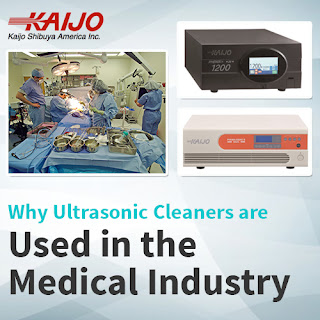Since medical devices are often delicate and have high cleaning
standards, industrial
ultrasonic cleaners provide an ideal solution, offering gentle cleaning and
complete removal of contaminants.
Medical devices that include surgical instruments and
medical implants are used inside the body and are subject to extremely high
standards of cleanliness and sterility. In addition, medical devices have
complex structures that mean intricate surfaces, tiny crevices, dead-end holes
and even inside slots and threaded holes.
Many medical devices cannot be exposed to heat, harsh
cleaning chemicals and intense scrubbing which are typically used in
traditional cleaning methods. Not only these methods costly and cause potential
damage to medical devices, but they also do not guarantee that they provide complete
cleaning.
Industrial
ultrasonic cleaners rely on sound waves, which produce microscopic
cavitation bubbles in the cleaning solution. The formation and collapse of
these bubbles agitate the cleaning solution near the medical device surfaces to
dislodge any dirt or contamination that may be present.
Low ultrasonic frequencies produce comparatively large bubbles with an intense cleaning action for rugged devices. High ultrasonic frequencies, on the other hand, produce smaller bubbles with a gentle cleaning action which is the frequency used to clean delicate parts such as medical devices.
Low ultrasonic frequencies produce comparatively large bubbles with an intense cleaning action for rugged devices. High ultrasonic frequencies, on the other hand, produce smaller bubbles with a gentle cleaning action which is the frequency used to clean delicate parts such as medical devices.
No matter how complex medical devices are, once they
are immersed in the cleaning solution, the microscopic cavitation bubbles are
formed inside the tiniest crevices and dislodge any contaminants, cleaning down
to the original surface. A complete cleaning is extremely important, especially
for implants. If these implants still have leftover contaminants due to
improper and incomplete cleaning, it could result in the rejection of the
implants.
While industrial ultrasonic cleaning systems effectively remove contaminants, they do not, by themselves, kill or eliminate bacteria. Thus, adding a sterilizing solvent to the cleaning solution helps the cleaning action process and the action of the cleaning bubbles heightens the sterilizing effect as well.
While industrial ultrasonic cleaning systems effectively remove contaminants, they do not, by themselves, kill or eliminate bacteria. Thus, adding a sterilizing solvent to the cleaning solution helps the cleaning action process and the action of the cleaning bubbles heightens the sterilizing effect as well.
For more information read the complete article, “Why
Ultrasonic Cleaners Are Used in Medical Industry”. Contact Kaijo for a free
consultation or quote by email info@kaijo-shibuya.com
or call 408–675–5575 to discuss your cleaning requirements.


No comments:
Post a Comment